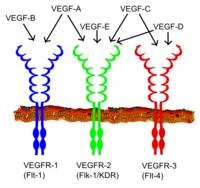
Targeting G protein-coupled receptors in cancer therapy.
Sign Up to like & getrecommendations! Published in 2020 at "Advances in cancer research"
DOI: 10.1016/bs.acr.2019.11.002
Abstract: As basic research into GPCR signaling and its association with disease has come into fruition, greater clarity has emerged with regards to how these receptors may be amenable to therapeutic intervention. As a diverse group… read more here.
Keywords: research; targeting protein; protein coupled; receptors cancer ... See more keywords

Eph receptors as cancer targets for antibody-based therapy.
Sign Up to like & getrecommendations! Published in 2020 at "Advances in cancer research"
DOI: 10.1016/bs.acr.2020.04.007
Abstract: Receptor tyrosine kinases (RTKs) are integral membrane sensors that govern cell differentiation, proliferation and mobility, and enable rapid communication between cells and their environment. Of the 20 RTK subfamilies currently known, Eph receptors are the… read more here.
Keywords: antibody based; eph receptors; receptors cancer; cancer targets ... See more keywords

Peptide receptors as cancer drug targets
Sign Up to like & getrecommendations! Published in 2019 at "Annals of the New York Academy of Sciences"
DOI: 10.1111/nyas.14100
Abstract: Neuropeptides function as neuromodulators in the brain, whereby they are released in a paracrine manner and activate G protein–coupled receptors (GPCRs) in adjacent cells. Because neuropeptides are made in, and secreted from, cancer cells, then… read more here.
Keywords: drug targets; sclc; peptide receptors; receptors cancer ... See more keywords

α9-Containing Nicotinic Receptors in Cancer
Sign Up to like & getrecommendations! Published in 2021 at "Frontiers in Cellular Neuroscience"
DOI: 10.3389/fncel.2021.805123
Abstract: Neuronal nicotinic acetylcholine receptors containing the α9 or the α9 and α10 subunits are expressed in various extra-neuronal tissues. Moreover, most cancer cells and tissues highly express α9-containing receptors, and a number of studies have… read more here.
Keywords: cancer; receptors cancer; nicotinic receptors; containing nicotinic ... See more keywords

Targeting Receptors on Cancer Cells with Protein Toxins
Sign Up to like & getrecommendations! Published in 2020 at "Biomolecules"
DOI: 10.3390/biom10091331
Abstract: Cancer cells frequently upregulate surface receptors that promote growth and survival. These receptors constitute valid targets for intervention. One strategy involves the delivery of toxic payloads with the goal of killing those cancer cells with… read more here.
Keywords: targeting receptors; receptors cancer; cells protein; cancer cells ... See more keywords

Eph Receptors in Cancer
Sign Up to like & getrecommendations! Published in 2023 at "Biomedicines"
DOI: 10.3390/biomedicines11020315
Abstract: Eph receptor tyrosine kinases play critical functions during development, in the formation of tissue and organ borders, and the vascular and neural systems. Uniquely among tyrosine kinases, their activities are controlled by binding to membrane-bound… read more here.
Keywords: eph receptors; development; receptors cancer;

Antibody Targeting of Eph Receptors in Cancer
Sign Up to like & getrecommendations! Published in 2020 at "Pharmaceuticals"
DOI: 10.3390/ph13050088
Abstract: The Eph subfamily of receptor tyrosine kinases mediate cell-cell communication controlling cell and tissue patterning during development. While generally less active in adult tissues, they often re-emerge in cancers, particularly on undifferentiated or progenitor cells… read more here.
Keywords: eph receptors; antibody targeting; targeting eph; receptors cancer ... See more keywords

Odorant receptors in cancer
Sign Up to like & getrecommendations! Published in 2022 at "BMB Reports"
DOI: 10.5483/bmbrep.2022.55.2.010
Abstract: Odorant receptors (ORs), the largest subfamily of G protein-coupled receptors, detect odorants in the nose. In addition, ORs were recently shown to be expressed in many nonolfactory tissues and cells, indicating that these receptors have… read more here.
Keywords: expression; receptors cancer; odorant receptors; cancer ... See more keywords